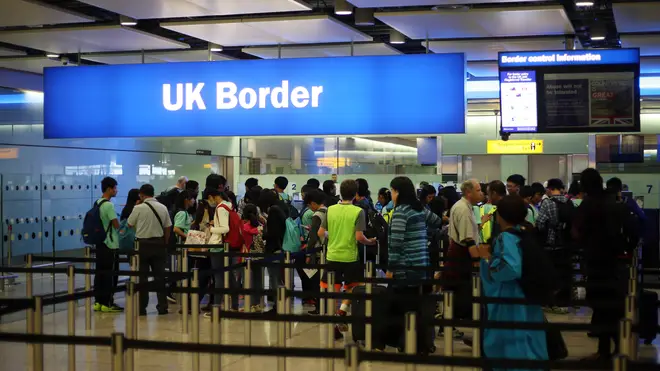
Ian Payne 4am - 7am
21 October 2020, 22:29

Many EU criminals will be barred from entering the UK when freedom of movement ends under new plans, according to the Home Office.
The new rules will come into force on New Years Day as part of the Government's bid for tougher border restrictions and a "firmer and fairer" immigration system after the Brexit transition period.
Confirming the move, the Home Office said current EU laws mean some foreign criminals are permitted to enter the UK but changes to legislation - due to be laid in Parliament on Thursday - mean those sentenced to more than a year in jail will not be allowed into the country.
Questions remains, however, as to how the criminal history of travellers will be checked if the UK loses access to EU crime databases at the end of the Brexit transition period, given no agreements have yet been reached amid the ongoing negotiations.
Read more: German MEP says Boris Johnson has 'been lying to the UK' over Brexit
Read more: Government suffers major defeat in House of Lords over Brexit bill
Home Secretary Priti Patel said the changes would make the UK "safer" and would mean criminals would be treated the same regardless of nationality.
Current rules mean officials must demonstrate that EU criminals coming into the UK present a "genuine, present and sufficiently serious threat" to society if they wish to bar them from entry and the decision cannot be based solely on criminal convictions, even if they were for murder or rape, the Home Office said.
The changes to the law, made in the form of a statutory instrument, will mean EU citizens will be subject to the same rules on entering the country as those already applied to non-EU citizens.

Business Minister sets out the difference between an Australia-deal and a No-Deal Brexit.
The rules will apply to everyone coming into the UK, including tourists and other visitors.
Those who have been sentenced to less than a year in jail could still be banned, however, as officials review their criminal history and consider whether they have sufficient ties to the UK such as relatives.
Offenders who have not gone to jail could also be barred if there is evidence they are "persistent" criminals, their crimes cause "serious harm" or if it is decided their "presence in UK is not conducive to the public good".
Equally, anyone with a criminal conviction of any kind in the past 12 months who is looking to come to the UK for the first time could be denied entry.
Read more: Boris Johnson says UK should 'get ready' for no deal Brexit
Many people may also be refused entry at the border if they breach customs regulations, such as going over duty-free limits or bringing in restricted or prohibited goods.
The changes also mean EU citizens found rough sleeping could be deported if they refuse support - like the offer of accommodation and benefits - from authorities.
Those who commit crime or display anti-social behaviour, like aggressive begging, while already in the UK could be told the leave the country, according to officials.
This is said to be part of a long-term government action plan to "get people off the streets".

David Davis: EU doesn't want UK to succeed post-Brexit
But the move would be a last resort after other options were exhausted and checks would be carried out to make sure those affected were not victims of slavery or trafficking, officials stressed.
There will be exceptions to the rule, including if banning someone from the UK would breach the European Convention on Human Rights or if their crimes are not recognised in the UK.
Read more: MPs vote to 'take back control of UK waters' as Fisheries Bill clears Commons
The changes will not apply to EU citizens who have been granted immigration status under the EU Settlement Scheme, or any others protected by the terms of the Withdrawal Agreement.
Their right to be in the UK could be revoked if they commit crimes after January 1, the Home Office warned.
The news comes as the Extradition Bill is expected to receive Royal Assent, giving police the power to immediately detain internationally some wanted criminals without having to apply for a UK arrest warrant first.